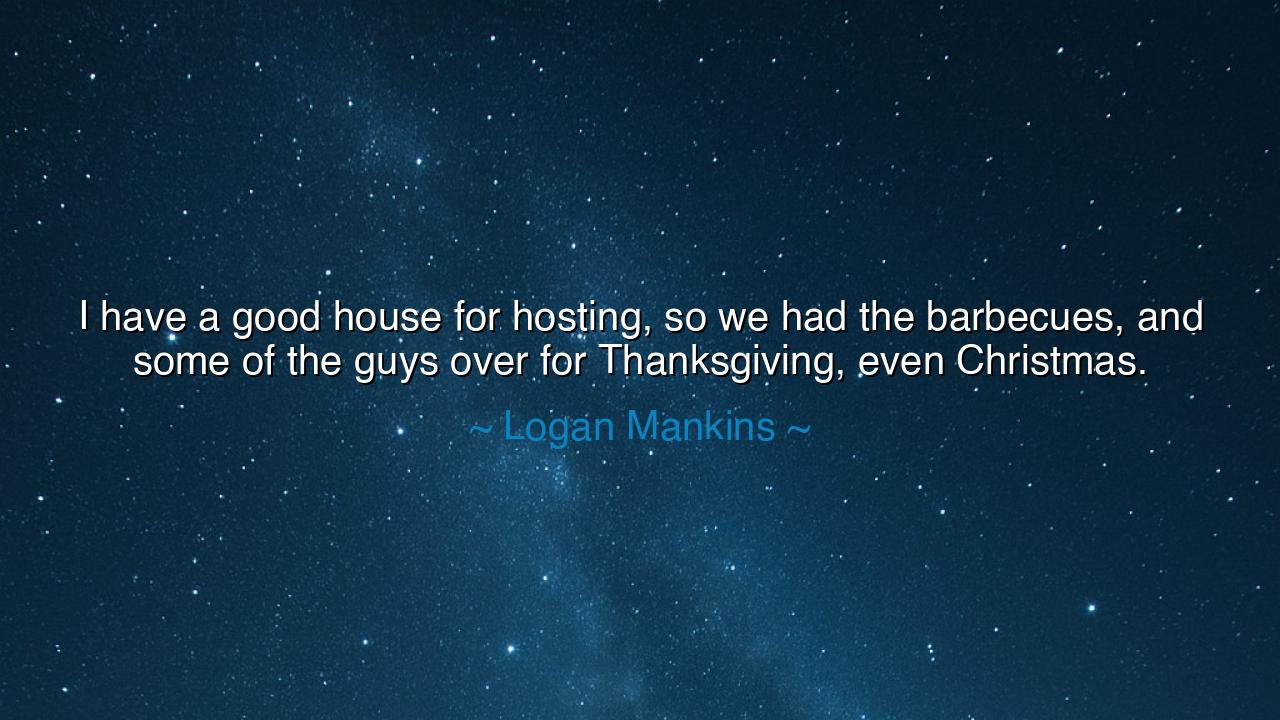
I have a good house for hosting, so we had the barbecues, and
I have a good house for hosting, so we had the barbecues, and some of the guys over for Thanksgiving, even Christmas.






Logan Mankins, with words simple yet profound, once said: “I have a good house for hosting, so we had the barbecues, and some of the guys over for Thanksgiving, even Christmas.” At first glance, this seems a casual remark, the memory of a football player recalling gatherings of teammates. Yet beneath its plainness lies an eternal truth about hospitality, brotherhood, and the sacred duty of opening one’s home. To provide a place of warmth when others are far from their own families is to embody the timeless virtue of fellowship.
The origin of such a statement comes not merely from Mankins’ career as a professional athlete but from the human need for community. Athletes, like soldiers, often live far from their families, bound by schedules and commitments that keep them apart during holidays. In such moments, the bonds between teammates transform into something deeper—they become a second family, sustained by shared meals, laughter, and the breaking of bread together. Mankins’ house was not just walls and a roof, but a sanctuary where loneliness was driven away by fellowship.
History is filled with echoes of this truth. In ancient Greece, xenia, or the law of hospitality, was regarded as sacred. A traveler or comrade who was far from home was to be welcomed, fed, and treated with honor, for the gods themselves were said to wander in disguise. In medieval times, knights traveling to distant courts would find sustenance in the halls of fellow warriors, where meals shared meant bonds forged. And in the barracks of modern wars, soldiers cut off from their kin would share rations and makeshift feasts, finding comfort not in extravagance, but in companionship.
The deeper meaning of Mankins’ words lies in the act of giving space. To open one’s home is to open one’s heart. A house for hosting is not measured by its size or splendor, but by its spirit of welcome. For in gathering others around the table, one affirms that no man should walk through life alone. Holidays are not only about family by blood, but also about family by choice—those companions whose presence lightens the burdens of the journey.
Consider the story of George Washington during the harsh winter at Valley Forge. Though resources were scarce and the soldiers were freezing, Washington often gathered with his men, sharing what little food they had. Those small moments of unity held the army together, reminding them that though their circumstances were grim, they were bound by something greater than hunger or hardship. Mankins’ barbecues and holiday gatherings carry the same spirit in modern form: the recognition that fellowship can sustain the soul more deeply than any feast alone.
The lesson for future generations is clear: do not hoard your home or your blessings. If you have space, make it a place of welcome. If you have food, make it a banquet of friendship. If you have time, spend it not only on yourself, but on those who may feel forgotten. In this way, you will transform your dwelling into a living temple of love and belonging.
Practical wisdom follows: each person should cultivate the art of hospitality. Host gatherings not for grandeur, but for connection. Invite the lonely, the stranger, the teammate, or the neighbor. Celebrate together not only in times of prosperity, but even in modesty, for the true feast lies in the laughter, the conversation, the presence of shared humanity. In doing so, you will discover that your home is more than wood and stone—it is a fortress of fellowship.
Thus, Logan Mankins’ simple words shine with ancient power. To host is to honor. To gather others is to heal. To share a holiday is to multiply joy and divide sorrow. Let this wisdom endure: open your doors, set your table, and in so doing, you will weave a circle of belonging that will outlast the feast itself. For in the end, it is not the house that matters, but the hearts made at home within it.






AAdministratorAdministrator
Welcome, honored guests. Please leave a comment, we will respond soon